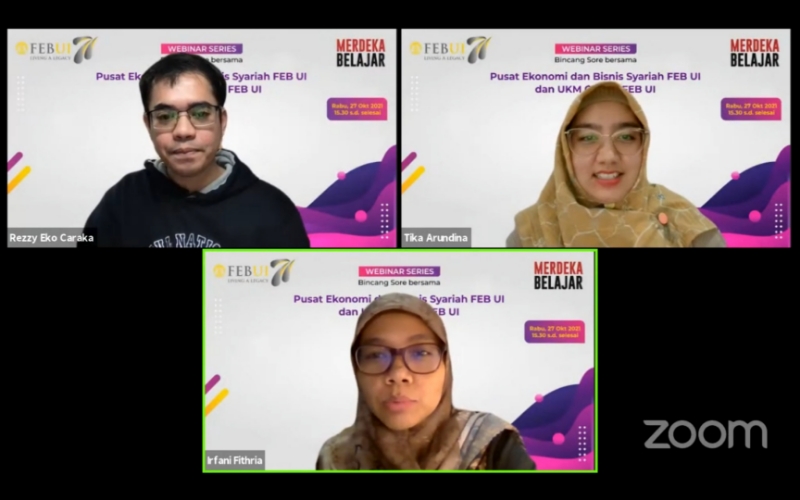Afternoon Talk #5 FEB UI Anniversary: PEBS and UKM Center FEB UI
Rifdah Khalisha – Public Relations FEB UI
DEPOK – (27/10/2021)
On Wednesday (27/10), for the Series of the 71st Anniversary Events, FEB UI held the Series 5 Afternoon Talk with the Islamic Economics and Business Center (PEBS) and the UKM Center (UKMC) FEB UI.
Present as a speaker was Tika Arundina, Ph.D. (Head of Islamic Finance Research Cluster PEBS FEB UI) and Rezzy Eko Caraka, Ph.D. (FEB UI lecturer). Also present was Dr. Irfani Fithria Ummul Muzayanah (Head of Student Affairs Office FEB UI) as the host of the event.
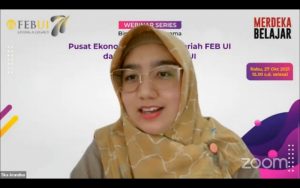
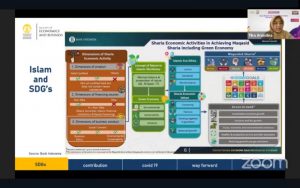
Tika discussed the topic of integrating Islamic commercial and social finance to achieve sustainable development. According to Tika, Indonesia currently has designed a roadmap and expressed a commitment to sustainable development in various aspects. In line with that, Islam recognizes maqashid al sharia, namely sharia, which aims to achieve the benefit or goodness of mankind in the world and in the hereafter.
Meanwhile, sharia economic activities cover all economic sectors that have halal products, non-usury financing, and ethical business processes, including social concerns and environmental sustainability. In Al-Qasas verse 77, it is also written that it is forbidden to do damage to the earth in accordance with the concept of a green economy. “Basically, we have been on the same path.” she said.
According to Tika, zakat and waqf can be effectively aligned with the social Sustainable Development Goals (SDGs). So far, the use of zakat is more related to the environment and the use of waqf is more related to social infrastructure, humanity, or development.
She revealed that, “The average growth of zakat and waqf is quite high, as much as 35.34 percent per year. However, the realization of 12 billion in 2020 is still far from its potential, considering that the majority of Indonesians are Muslims. Moreover, the socialization efforts have been massive, the National Amil Zakat Agency (BAZNAS) and the Amil Zakat Institution (LAZ) are widely dispersed at the district, city, provincial and national levels.”
The Islamic financial system consists of commercial and social finance. “We need to combine the two to form an integrated Islamic commercial and social financial system. That way, the impact will be tremendous. In fact, it is able to achieve many dimensions of financial inclusion,” she said.
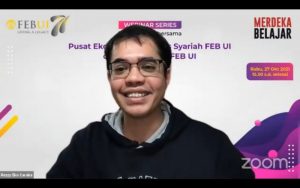
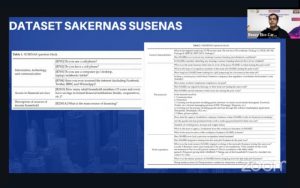
In continuation, Rezzy reviewed the business vulnerability index and MSME problems during COVID-19 through data mining and text mining approaches. For him, research does not start from confirming hypotheses with data, but moves from exploration with data to obtain maximum information. In big data, there has been a paradigm shift in research from search (a highly targeted search) to discovery (a more opportunistic search).
He explained, “Simply put, data mining explains the causal relationship between variables, where the data is structured. If text mining uses natural language processing in the form of speech or writing recognition, the data is semi-structured and unstructured.
The pandemic has mandated various schemes of adaptation to new habits. Not only for every individual in carrying out their activities, but also including MSME players in using strategies to survive.
In his research, Rezzy took data from the National Socio-Economic Survey (SUSENAS), and the National Labor Force Survey (SAKERNAS), utilizing digital technology, access to financial services, and a description of household income sources.
After going through the processing, the research shows some top words. “We can correlate each word to form a topic so that it is easier to understand the condition of MSMEs, for example the words pandemic, noodle, beginning, business, media, effort, actually, social, process, and sell, related to the process of industrial media activities during the pandemic.” he explained.
(am)

